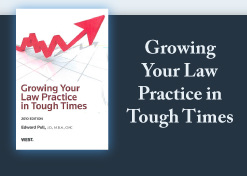|
How Do You Make a
Lawyer Referral?
Very Carefully!
Whether because a conflict of interest exists, or because of unavailability, or lack of expertise in the matter at hand, lawyers sometimes need to refer clients to another lawyer. It's a common enough practice that sometimes does not receive the thought and due diligence it requires. The Rules of Professional Conduct and court decisions make clear in different contexts that providing outside legal help through a referral arrangement should never be undertaken cavalierly.
You should answer four questions before referring your client to a different lawyer for a matter:
1) Competence: Can the referral lawyer handle the matter?
2) Economics: Can your client afford the fee of the referral lawyer?
3) Personalities: Do the cultural background and personal temperament of the client being referred match those of the referral lawyer? In other words, referring a blue collar individual or a young startup entrepreneur to a lawyer at a large, white shoe firm may be a prescription for dissatisfaction, or even disaster.
4) Business: Do you stand to benefit from the referral arrangement? In other words, the referral lawyer should definitely be someone you trust not to steal your client, and ideally should be someone who can make referrals back to you.
Identifying a lawyer to whom you can refer a client is too important a matter to leave to chance. As part of your marketing and professional development activities, you should develop a circle of colleagues outside your firm whom you know and value enough to entrust a client to when appropriate. Ideally these colleagues should represent a range of practice disciplines beyond your own fields of practice. This creates a significant referral advantage. By knowing more potential referral lawyers, you can refer the client to several different competent alternatives and suggest that the client make the choice.
Multiple referrals will give you protection if the client is later dissatisfied or the client asserts that the lawyer is guilty of malpractice. Your client will be less liable to sue, and certainly less likely to recover from you, for negligent referral.
Finally, a warning on fees. In many jurisdictions, referral fees (or more practically, commissions) may be prohibited. State Bar associations don't think law is a business, and thus don't look kindly on what they view as selling and buying clients. Fee splitting between two lawyers is more accepted and may be more practical, but again be sure to check your jurisdictional rules and be sure to thoroughly document all fee splitting arrangements.
|
|

Following the worst economic crisis since the Great
Depression, and facing a sea change in clients' demands
and expectations, law firms must respond and adapt
quickly and effectively. Law firms must choose the kind of
law practice they will be; the marketing and business
development tactics they will use; the overhead that is
critical to their functioning; how to price, bill and collect
for services; and how to manage the cash flow cycle.
Success lies in identifying and capturing the right kinds of
clients, providing the services those clients need in ways
that add value, and ensuring prompt payment and the
ability to grow profits. This book, based on the
experiences of Ed and his clients over 20 years of
coaching and consulting, provides the keys to
successfully thriving in the new era.
Now Available
Special New Release Price: $79
Regular Price: $120
Call or Order Online at:
1-800-837-5880
www.lawbiz.com





|

|
|
|

Personal Commentary
Join me on Thursday, October 21st, for breakfast in Washington, D.C. Contact me by email or call 800-837-5880, for the details and location.
Ed Poll
lawbiz.com
lawbizblog.com
www.LawBizForum.com
800-837-5880
Please use the URL below to link to this issue:
www.lawbiz.com/nlimages/tip-10-19-10.html
|

|

What Readers Are Saying...
"No matter how you slice it, there is
no substitute for wisdom and
experience. Ed Poll has
demonstrated both in this eyeopening
book about the essential
elements of running a profitable law
practice. He provides practical
wisdom along with simple ways to
adopt and incorporate best practices
for each. After explaining the pros
and cons of every decision, he makes
recommendations and provides
useful guides disguised as key
principles. Buy the book so you too
can access Ed's wisdom and
experience. It's worth much more
than the investment."
STEWART L. LEVINE. ESQ.,
FOUNDER, RESOLUTIONWORKS
AUTHOR, GETTING TO RESOLUTION;
THE BOOK OF AGREEMENT AND
COLLABORATION 2.0
|

|

|






